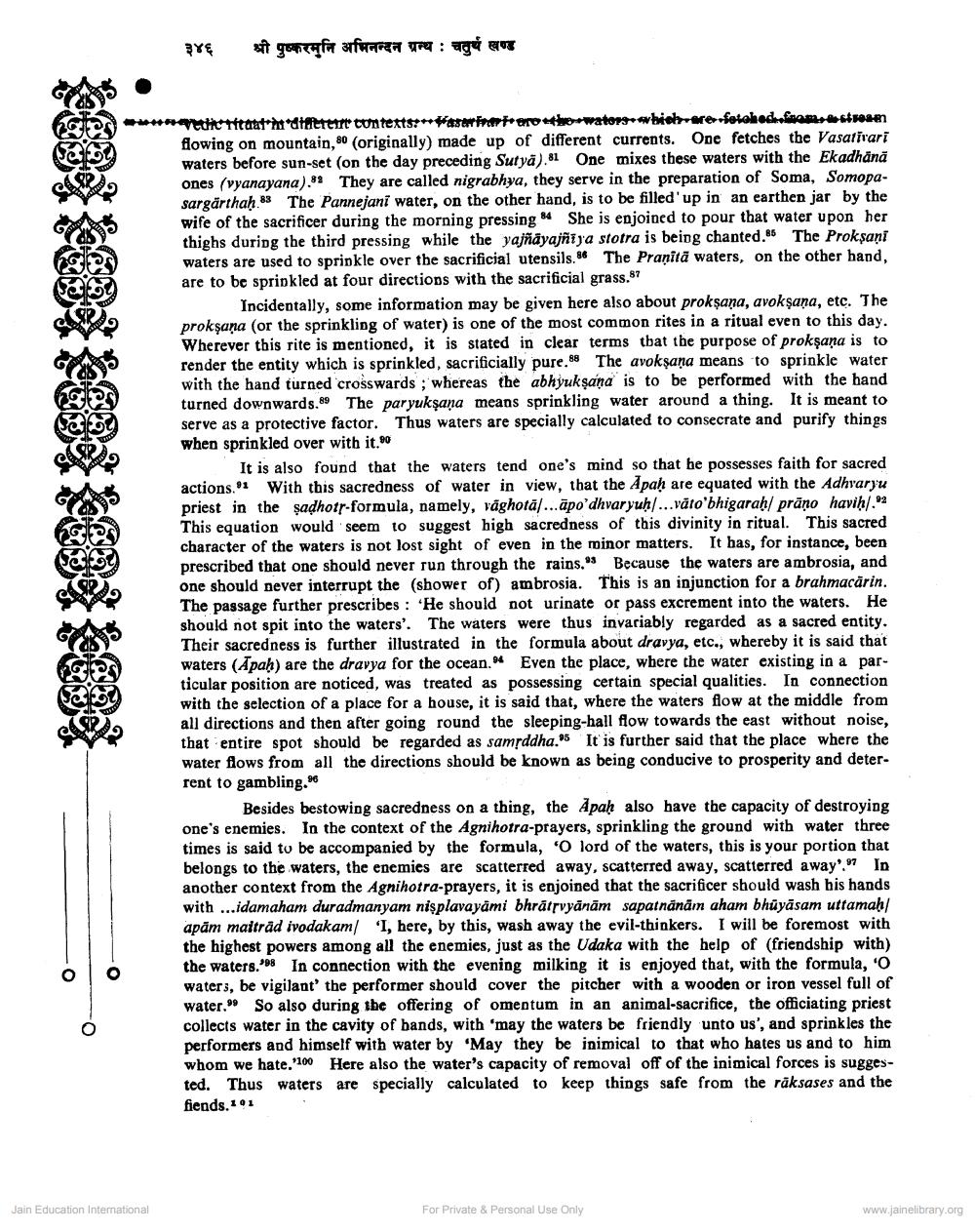________________
३४६
श्री पुष्करमुनि अभिनन्दन ग्रन्थ : चतुर्थ खण्ड
*petite tatt hedtfittttt tuntettszatartarto erothorwatorswidrare fotokadalomtonen
flowing on mountain, 80 (originally) made up of different currents. One fetches the Vasatirari waters before sun-set (on the day preceding Sutya).81 One mixes these waters with the Ekadhänā ones (vyanayana). They are called nigrabhya, they serve in the preparation of Soma, Somopasargärthah 83 The Pannejani water, on the other hand, is to be filled up in an earthen jar by the wife of the sacrificer during the morning pressing * She is enjoined to pour that water upon her thighs during the third pressing while the yajñāyajñiya stotra is being chanted.86 The Proksani waters are used to sprinkle over the sacrificial utensils.86 The Pranitā waters, on the other hand, are to be sprinkled at four directions with the sacrificial grass.$?
Incidentally, some information may be given here also about proksana, avokşana, etc. The prokşaņa (or the sprinkling of water) is one of the most common rites in a ritual even to this day. Wherever this rite is mentioned, it is stated in clear terms that the purpose of prokşaņa is to render the entity which is sprinkled, sacrificially pure.88 The avokşana means to sprinkle water with the hand turned crosswards; whereas the abhyuksana is to be performed with the hand turned downwards.89 The paryuksana means sprinkling water around a thing. It is meant to serve as a protective factor. Thus waters are specially calculated to consecrate and purify things when sprinkled over with it. **
It is also found that the waters tend one's mind so that he possesses faith for sacred actions. With this sacredness of water in view, that the Apah are equated with the Adhvaryu priest in the şadhots-formula, namely, rāghotā/...āpo'dhvaryuh/...väto'bhigarah/ prāno haviḥ/.92 This equation would seem to suggest high sacredness of this divinity in ritual. This sacred character of the waters is not lost sight of even in the minor matters. It has, for instance, been prescribed that one should never run through the rains. Because the waters are ambrosia, and one should never interrupt the shower of) ambrosia. This is an injunction for a brahmacärin. The passage further prescribes : 'He should not urinate or pass excrement into the waters. He should not spit into the waters'. The waters were thus invariably regarded as a sacred entity. Their sacredness is further illustrated in the formula about dravya, etc., whereby it is said that waters (Āpah) are the dravya for the ocean. Even the place, where the water existing in a particular position are noticed, was treated as possessing certain special qualities. In connection with the selection of a place for a house, it is said that, where the waters flow at the middle from all directions and then after going round the sleeping-hall flow towards the east without noise, that entire spot should be regarded as samsddha. It is further said that the place where the water flows from all the directions should be known as being conducive to prosperity and deterrent to gambling.
Besides bestowing sacredness on a thing, the Apah also have the capacity of destroying one's enemies. In the context of the Agnihotra-prayers, sprinkling the ground with water three times is said to be accompanied by the formula, 'O lord of the waters, this is your portion that belongs to the waters, the enemies are scatterred away, scatterred away, scatterred away." In another context from the Agnihotra-prayers, it is enjoined that the sacrificer should wash his hands with ...idamaham duradmanyam nişplavayāmi bhrātsvyānām sapatnänām aham bhūyāsam uttamah/ apām maitråd ivodakam/ 'I, here, by this, wash away the evil-thinkers. I will be foremost with the highest powers among all the enemies, just as the Udaka with the help of (friendship with) the waters." In connection with the evening milking it is enjoyed that, with the formula, 'O waters, be vigilant' the performer should cover the pitcher with a wooden or iron vessel full of water. So also during the offering of omentum in an animal-sacrifice, the officiating priest collects water in the cavity of bands, with 'may the waters be friendly unto us', and sprinkles the performers and himself with water by 'May they be inimical to that who hates us and to him whom we hate. "100 Here also the water's capacity of removal off of the inimical forces is suggested. Thus waters are specially calculated to keep things safe from the räksases and the fiends.1 91
Jain Education International
For Private & Personal Use Only
www.jainelibrary.org




